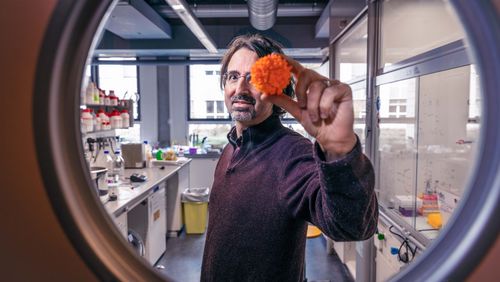
“Our virus centre will be part of a global network”
Francesco Stellacci is certain that future pandemics are unavoidable. To be prepared, innovative research as well as collaboration on a global scale are necessary—for example, at the future Werner Siemens Foundation Center for Antivirals Research, whose setup is financed by the Werner Siemens Foundation.
Professor Stellacci, how have you experienced the pandemic year 2021?
Francesco Stellacci: It’s been a difficult year for us all. On the positive side, we’ve probably learned more about the Sars-CoV-2 virus than about any other virus. And that in record time. The virus first appeared in December 2019 and by the spring of 2020, its genome had already been sequenced and antibodies identified. No one would have believed the global research community capable of such rapid and coordinated action. I assume that this will happen even more quickly with emerging novel viruses than it did with the coronavirus—now we have both experience and an infrastructure that didn’t exist before the pandemic.
We now have vaccines for Sars-CoV-2. Is it still important that we find drugs to treat it?
A vaccination is always the top priority when we’re dealing with viral diseases. But we shouldn’t forget that people all over the world will never be vaccinated at the same rate. In Africa, for example, it will take a long time—if it ever happens—before everyone who wants to be immunised has received a shot. And the risks surrounding testing vaccines on humans would be less dangerous if drugs for treating a viral infection were already available. These medications give us time to develop a vaccine, although it should be noted that there are still many viruses for which no vaccine exists—HIV to name one. And while the vaccines for the coronavirus are incredibly effective, that’s in no way the case for all vaccines. What would happen if the next pandemic were caused by a virus that is as effective at evading vaccines as HIV? These are all reasons why antiviral drugs will remain important.
Do you think we have to expect future pandemics?
Certainly. Since the 1970s, we’ve been dealing roughly every four years with an epidemic or pandemic caused by new viruses—from HIV to the coronavirus. The growth in the world’s population and globalisation are the root causes, and they’re also the reason why epidemics or pandemics will probably occur even more frequently in future. And while many viruses could be the trigger, the greatest danger is posed by those viruses that cause respiratory diseases: they’re airborne, so it’s more difficult to protect ourselves against them. In my opinion, the next pandemic will most likely be caused by influenza viruses, as they reappear every year with slight mutations. It’s also possible that the coronavirus will stay with us in a similar way.
How can we prepare ourselves for pandemics?
There’s an urgent need to convene on a global level and to discuss future ways of dealing with this kind of situation. We need to ask ourselves how we should proceed when a pandemic is on the horizon and how we should organise the division of labour. It’s crucial that we plan ahead and better anticipate what threats might come our way. And we need more research on viruses. To date, there are still only a few specific antiviral drugs, and developing new agents remains time intensive. This has to change.
You want to establish a centre for antiviral research at EPFL. What will it look like?
Currently, we’re working on defining the new centre. We have until 2023 to formulate our vision and present a concept that the Werner Siemens Foundation can decide on. The motivation is clear: in the history of medicine, viral diseases have been neglected for far too long. This is seen in the fact that there are numerous cancer research centres in Europe, yet only a few institutions dedicated to researching viruses. The new EPFL centre will help close this gap. We want to become a major viral research centre in Europe and to create global networks and platforms for knowledge exchange. Our goal is to win the fight against future pandemics and to treat dangerous viral infections.
Why is Lausanne the right place?
Several EPFL research groups have already expressed interest in working at this kind of a centre. Among them are groups already active in researching viruses, but there are also those that would like to enter this field with new ideas. This means that, in addition to my group’s approach, the new centre would also pursue other strategies to combat viruses. It’s a fantastic constellation, because we need a diversity of ideas to increase our chances of success—the goal of fighting viruses is too important to put all our eggs in one basket. And if we succeed in attracting other backers in addition to the Werner Siemens Foundation, we can extend our work to researching areas beyond developing antiviral drugs—like vaccines against viral infections, for example.
If all goes well, will you and your colleagues begin setting up the centre in 2023?
Yes, although thanks to the second grant from the Werner Siemens Foundation, which we received in the spring of 2021, we can already start purchasing research equipment and make it available throughout the entire university. This shared facility will unite research groups, and the various groups will have the opportunity to immediately begin testing new ideas for antiviral agents. The best-case scenario is that we’ll already have developed new, promising approaches to combating viruses when we officially open the Werner Siemens Foundation Center for Antivirals Research in 2023.






